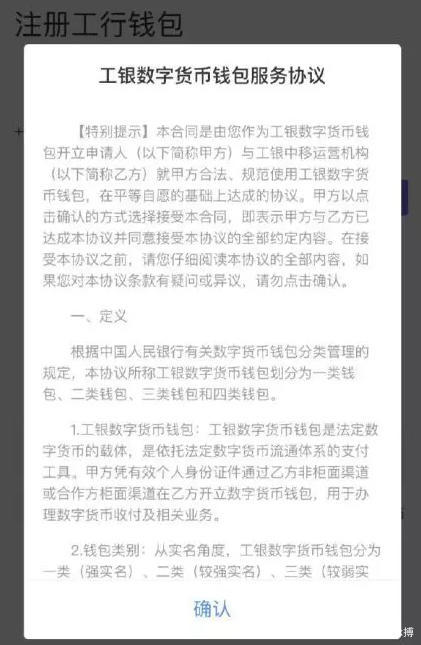Inside the ICBC internal digital wallet: China leads the currency trend for 3000 years
Text: Mutual chain pulse · Yuan Shang
Source: Interchain Pulse
China’s innovation in currency has always led the times.
On October 29, ICBC’s “Digital Money Wallet Service Agreement” flowed out. One day, Huang Qifan, vice chairman of the China International Economic Exchange Center, said at the first Bund Financial Summit: “The People’s Bank of China is probably the first global digital currency to be launched. The central bank." There are indications that the Chinese central bank's digital currency has reached the final release.
- Jianan Zhizhi prospectus full interpretation: 99% of revenue comes from mining machines and related sales, future growth bets on AI chips
- David Marcus: Libra's anti-money laundering standard is higher than other payment networks
- Bloomberg: The $5 billion encryption loan market is just a credit bubble that is about to burst?
If there is no accident, the central bank digital currency with circulation value and national credit is the first to be used in China. (Although some countries have previously issued digital currencies, such as Venezuelan oil coins, they all suffer from illness)
"Historical Records Taishigong Preface" writes that "a trip to a currency, to a farmer's business" means that money is used to communicate the means of product exchange, and is naturally produced to meet the needs of goods. And China has almost all the original currency forms.
The first stage of the currency is the physical currency or the natural currency.
More than 1000 BC, the Chinese commercial dynasty appeared copper imitation shellfish, which was the earliest metal currency form of mankind. The copper imitation shell pushed the human currency to the second stage of metal currency. In the Western Zhou Dynasty, in the 11th century BC, the shovel coins appeared, which evolved from ancient farming tools and shaped like the current shovel. In contrast, the metal currency of ancient Egypt and ancient Greece appeared around 700 BC.
The distribution rights of metal currencies are often in the hands of administrative agencies, and the administrative departments endorse their own credits for monetary value. Since the Qin and Han dynasties, China has unified the monetary structure of the coinage and the “Tianyuan place”. The materials used are cheaper bronze or iron. In Western countries, precious metals such as gold and silver are used more frequently. This means that ancient China required the government to have higher credit.
The development of credit currency to the Song Dynasty, where the commodity economy is more developed, produced the world's earliest banknote, Jiaozi, which is the third stage of currency development.
Jiaozi was first produced in the folk. In the early years of the Northern Song Dynasty, Sichuan used iron money, which had a small body weight and was inconvenient to circulate. As a result, the merchant issued a banknote called the Jiaozi, instead of the iron money. Chengdu's 16 wealthy merchants opened a branch shop for the printing and distribution of copper coins and exchanges, and opened the first for private finance. Every year when they are cooked, silkworm rice is printed on the same color paper. After Song Renzong took back the distribution rights of the Jiaozi to cope with military expenses. The manuscripts issued by the government's sub-bureaus are called official Jiaozi, and the printing of the official Jiaozi is more exquisite, and the anti-counterfeiting means is more sophisticated. In the era of official diplomacy, it was the full reserve of the imperial court that supported the purchasing power of the confidants.
Hyundai, in 2015, China has created a new monetary pattern – a cashless society. The CNBC News Channel of the United States reported on October 13, 2014 that a report by Niklas Arvidsson, an associate professor of industrial dynamics in Sweden, showed that by 2030, Sweden would be the first country to use no cash (no cash society). But without expecting it, China will be faster. According to a survey conducted by Ipsos, a world-renowned research company, at the end of last year, China's cashless payment penetration rate has reached 77%, far ahead of developed countries and regions such as the United States, Europe, and Japan. The domestic payment agency, WeChat payment data at the beginning of this year revealed that this data is close to 90%. When Zuckerberg, the founder of Facebook, accepted the US Congress question, he also regarded Alipay and WeChat payment as competitors.
The emergence of a cashless society provides a good mass base for digital currency, but it still follows the mechanism of banknote formation. It cannot be said that the fourth phase of the money progress, the digital currency phase. But if China's digital currency is first issued, then China will lead the currency into the fourth stage.
The latest news is that the Beijing News reporter has confirmed to ICBC that ICBC has not launched digital currency. Any information about digital currency is subject to the information of the People's Bank of China. At present, ICBC does not have the information to be released. However, ICBC has not denied preparation for digital currency issuance.

According to the screenshot, this is a screenshot of the ICBC digital wallet. Compared with the information disclosed by the previous digital currency, the users of the ICBC digital currency wallet will be divided into four categories according to whether they are real names. Perhaps these four categories also correspond to different users.
Please indicate the source.
We will continue to update Blocking; if you have any questions or suggestions, please contact us!
Was this article helpful?
93 out of 132 found this helpful
Related articles
- Vitalik: On the two-way bridging of eth1 and eth2
- Which block is the first benefit to the blockchain?
- What are the points worth noting in the Jianan Zhizhi prospectus?
- Why is the blockchain that has been blushing overnight a representative of "an important breakthrough" and "a new round of information technology"?
- You know the blockchain, now it’s time to understand the DCEP central bank digital currency.
- MakerDAO CEO: DeFi market still has these shortcomings
- Why is the promulgation of the cryptography method a tool to promote the blockchain?






